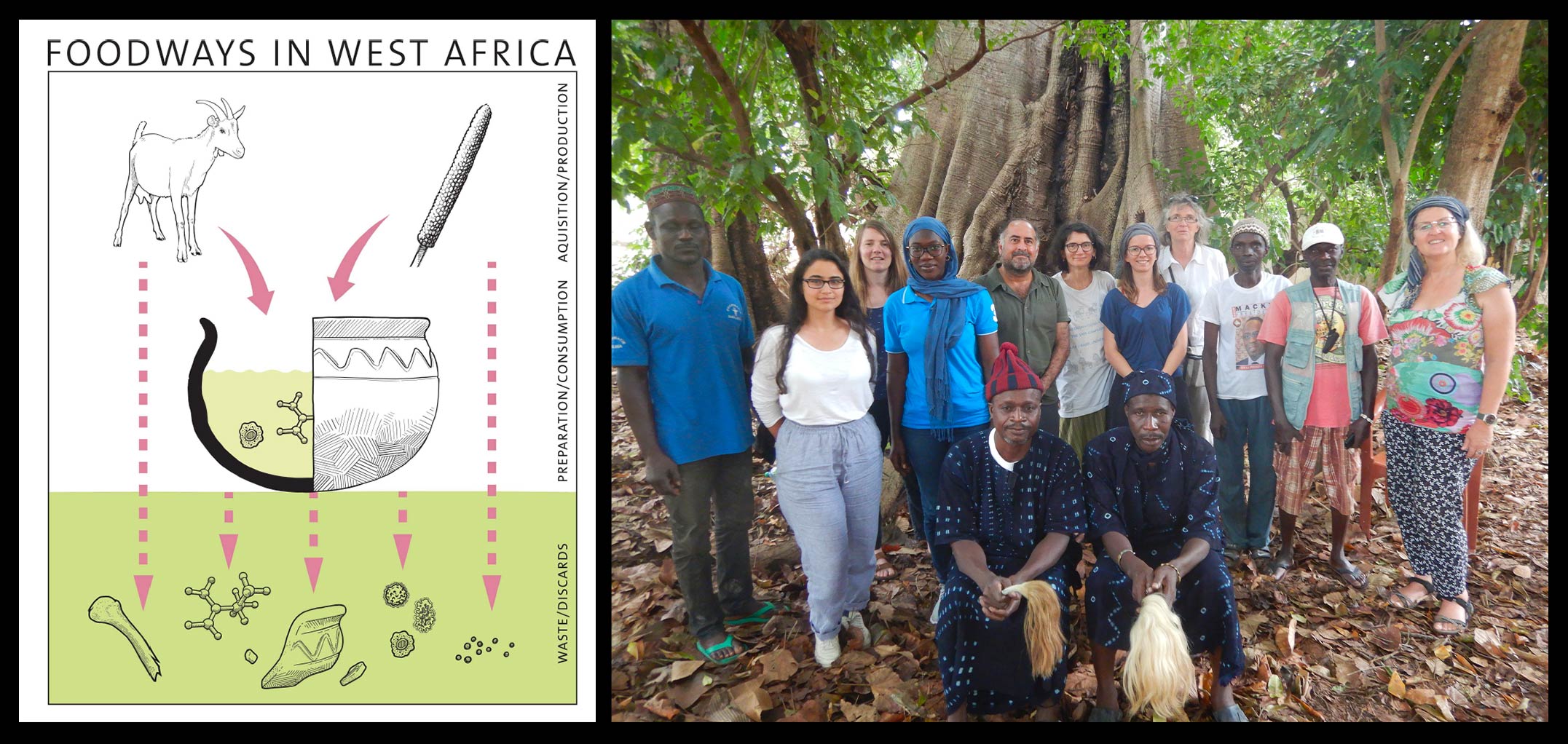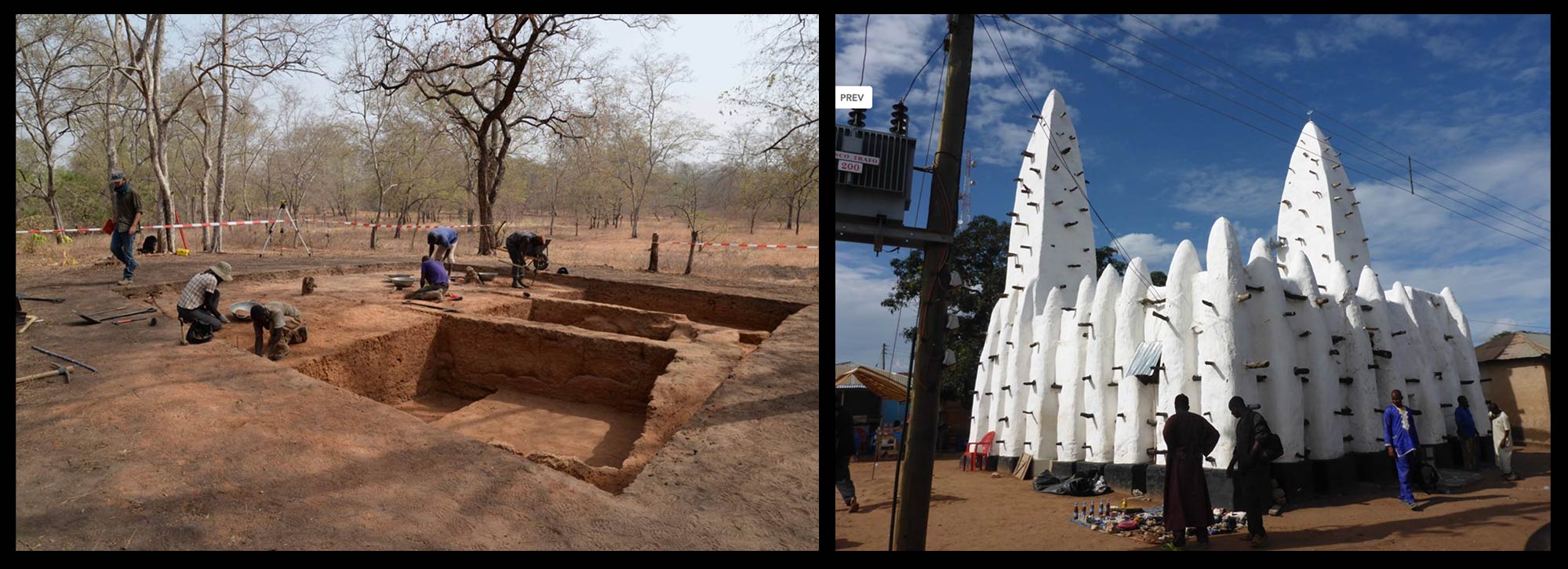Ethnoarchaeology and archaeology of Africa
ETHNOARCHAEOLOGY AND ARCHAEOLOGY OF AFRICA OVER THE LAST 3 MILLENNIA
Ethnoarchaeology, which was initiated in the Anthropology Department in the 1980s by Alain Gallay and has since been developed within the APA and ARCAN laboratories, aims to study the material cultures and behaviours of present-day communities. The aim is to build frames of reference (or models) linking material facts and their interpretations, capable of assisting the process of interpretation in archaeology.
This research strategy is part of a series of interdisciplinary studies aimed at understanding technical dynamics, the history of settlements and changes in lifestyles in Africa from the Iron Age to modern times.
The methods used include research interviews, documentation of technical processes, experiments, reference collections (pottery, fish, plants), archaeological excavations and laboratory analyses (dating, petrography, organic chemistry, tracerology, etc.). The themes developed mainly concern ceramics, metallurgy, architecture and food.

Research projects in progress
Project HOME
HOusing in the Margins of Empires: Archaeology and Ethnohistory of settlements in the megalithic region of Senegal and The Gambia.
(FNS Ambizione PZ00P1_216186 ; Applicant: Adrien Delvoye)
2023-2027 : https://data.snf.ch/grants/grant/216186
The project HOME (2023-2027) aims to gather the first archaeological and ethnohistorical reference data on inhabitations and domestic contexts in the central regions of Senegal and The Gambia; in a region that has until now been studied mainly for its megalithic funerary sites erected at the turn of the 1st and 2nd millennia CE (Gallay et al. 1982; Laporte et al. 2012; Holl and Bocoum 2014). With almost 20,000 megalithic monuments spread over some 1987 sites, Senegambia hosts one of the largest concentrations of monumental stone architecture on the African continent (Laporte et al. 2017; Delvoye 2021), some of which are even listed as UNESCO World Heritage Sites.
The transition between the 1st and 2nd millennia CE is a decisive period in West African history, that sees the development of political entities such as Ghâna (5th-13th c.), Songhay (7th-17th c.) or Mâli (13th-17th c.). Their authority and macro-regional influence relied on the control of strategic urban crossroads on long-distance trade routes, that connected areas as far apart as the Maghreb and the Sahara on the one hand, or the Sahelian and forested areas of the Gulf of Guinea on the other. In this context, Senegambia appears both at the periphery of the great "Empires" and at the heart of societies with unique material productions, and at the interface between different geo-climatic areas irrigated by major watercourses (Gambia, Senegal and Niger rivers). Despite some preliminary data (Lawson 2000; Gallay 2010; Holl and Bocoum 2017), the study of lifestyles and occupation of territories by ancient populations remains very scarce in Senegambia. Key issues such as the nature of habitats (forms, materials, construction techniques), modes of subsistence (plant and animal resources) and ancient societies' material culture remain largely unknown. For example, where are inhabitation sites located in relation to the megalithic necropolises already identified? Does the absence of important anthropogenic mounds - which in other regions relates to long periods of occupation - is a clue for shifting settlements reconfigured over generations?
The aim of the project HOME is to investigate these different thematic through an interdisciplinary approach, at the interface of Humanities and social sciences (archaeology, history) and natural sciences (archaeobotany, archaeozoology, geoarchaeology, geomorphology, ceramic petrography). It is implemented around an archaeological component (pedestrian surveys, test pits, extensive excavations) allowing the acquisition of new data on ancient societies, and an ethnohistorical dimension (Arab and European written sources, photographic archives, ethnographic sources) permitting a reconstuction of long-term cultural dynamics.
In 2022, preliminary pedestrian surveys carried out around the four UNESCO megalithic necropolises (Wanar, Sine-Ngayene, Ker Batch, Wassu) highlighted two particularly high potential areas for future archaeological investigations. The first is located in Senegal, in the Wanar sector. Numerous pottery and metallurgical remains suggesting an occupation between the 11th and 13th centuries were spotted on the outskirts of the megalithic necropolis and close to the present-day eponymous present-day village. The second sector is located in The Gambia, in the Ker Batch region. Dense concentrations of material remains on the river's shore seem to indicate multiple occupations from the medieval period (two megalithic necropolises, scattered pottery remains) to the Atlantic period. As early as the 18th century, the site was mentioned as an indigenous "port". Four excavation campaigns are scheduled between 2023 and 2027 in both sectors.
Scientific collaborators:
- Matar Ndiaye - Archéologue (IFAN-UCAD, Senegal)
- Hassoum Ceesay - Historien (NCAC, Gambie)
- Chloé Martin - Topographe (Eveha, France)
- Irka Hajdas - Géochronologue (ETHZ, Suisse)
- Louis Champion – Carpologue (IRD, France)
- Patricia Chiquet - Archéozoologue (MHN Genève, Suisse)
- Marylise Onfray - Géoarchéologue (INRAP, France)
- Benjamin Gehres - Pétrologue (CNRS, France)
- Moustapha Sall – Ethnoarchéologue (UCAD, Sénégal)
Foodways in West Africa: an integrated approach on pots, animals and plants
(SNSF Sinergia CRSII5_186324, applicants: Anne Mayor, Martine Regert and Tobias Haller)
2019-2024: https://data.snf.ch/grants/grant/186324
This SNSF Sinergia project (2019-2023) proposes an interdisciplinary approach to food and its evolution over the last two millennia in Senegal. The method aims to combine the results of analyses from the natural sciences (botany, zoology, chemistry) and the humanities and social sciences (archaeology, history, socio-anthropology), based on plants and animals consumed, pottery used for their preservation, preparation or consumption, archives and research interviews.
Food as a social, economic and cultural marker has emerged as a cross-disciplinary theme of interest. This project, focusing on Senegal over the last two thousand years, aims to develop a new method for approaching the history of food by combining different analyses of pottery (morphometric, tracerological, chemical, phytolithic), as well as the plants and animals consumed. By identifying the functions and contents of the pottery and comparing ethnographic and archaeological data, we will be able to document changes in cuisine over the long term. In addition, historical and socio-anthropological studies based on archives, oral history and participant observation are designed to shed light on changes in practices during the periods of Atlantic trade from the 15th century onwards, colonisation and globalisation.
At the Senegalese level, this research will help us to understand the changes in diet that have occurred over time, and will contribute to safeguarding an endangered culinary heritage. On an African scale, the bio-archaeological data will fill in the gaps in the data on the emergence and circulation of domesticated plants and animals. More broadly still, the methodology developed for identifying the functions of ceramics and their animal and plant residues will be useful for all archaeologists. In addition, the link with the current situation will provide key information on the institutional and political aspects of food security and nutrition, particularly in terms of understanding the factors hindering current dietary diversity.

Human settlement and paleoenvironment in Africa - Falémé project
(SNSF 10001F_212301, current applicants: Anne Mayor and Katja Douze)
- 2022-2024: https://data.snf.ch/grants/grant/212301
- 2019-2022: https://data.snf.ch/grants/grant/185384
- 2016-2019: https://data.snf.ch/grants/grant/164071
- 2015-2018: https://data.snf.ch/grants/grant/163022
- 2012-2015: https://data.snf.ch/grants/grant/143445
The aim of this project is to reconstruct the history of settlement and the technical and cultural dynamics of the Falémé valley in eastern Senegal, from the Palaeolithic period to the present day. It involves almost three months of archaeological excavations in the field every year. It is funded mainly by the Swiss National Science Foundation and the Swiss-Liechtenstein Foundation for Swiss Archaeological Research Abroad (SLSA), and is being carried out in collaboration with a number of partners in France and Senegal.
The main areas of research developed over the last 3 millennia are as follows:
- The study of current ceramic traditions and their technical and stylistic transformations since the Neolithic period
- The study of the variability of contemporary vernacular architecture, understanding the mechanisms behind technical borrowings and diachronic developments
- Endogenous fortifications and their role in the context of the Atlantic slave trade
- The study of the style and chemical composition of glass beads in order to reconstruct their origins and trade routes in the Phoenician, Islamic and Atlantic eras.
- The study of one of the oldest forms of iron metallurgy in Senegal, from the 4th century BCE to the 7th century BCE. BCE to the 7th c. CE
- The study of the Djoutoubaya settlement, close to the gold mines and contemporary with the kingdoms of Ghana and Mali, in particular its architecture, craftsmanship and dietary practices.

Gonja project: archaeology and Islamisation in northern Ghana
(SLSA, applicant: Denis Genequand)
The main objectives of the project are to study the Islamisation of northern Ghana from the 16th century onwards by resuming the archaeological study of the Gonja kingdom. Two lines of research have been defined.
The first and most important is the study of a major site, Old Buipe, using topographical surveys and extensive excavations to document the ancient state of the town and its evolution from the 15th to the 18th-19th centuries.
The second, very complementary project, focuses on the architectural study and dating of some of the last traditional mosques in northern Ghana, most of which are located in the Gonja area and whose origins are still poorly understood (the mosques of Bole, Larabanga, Banda Nkwanta, etc.).
The project is funded by the Swiss-Liechtenstein Foundation for Swiss Archaeological Research Abroad (SLSA). It is being carried out in collaboration with colleagues from the Department of Archaeology and Heritage studies in Accra.

